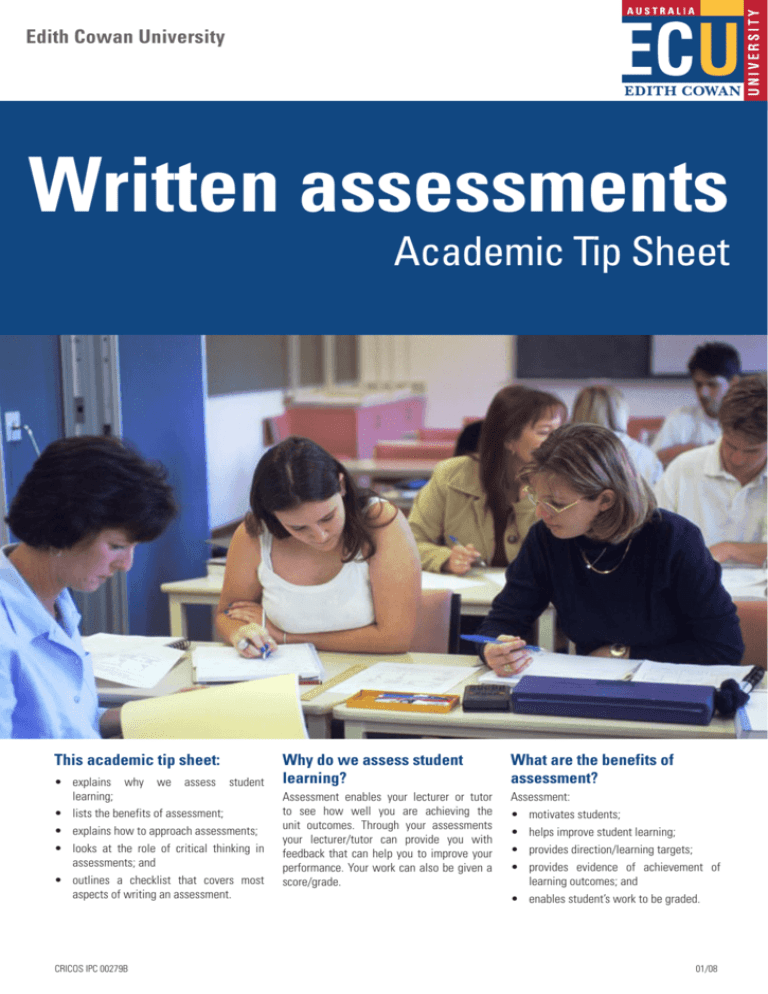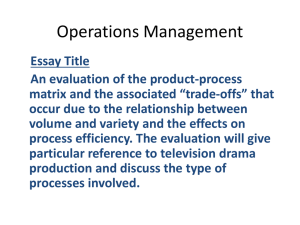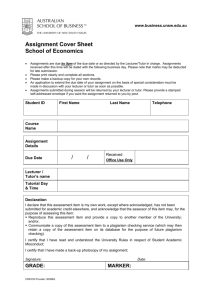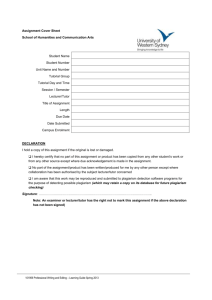Written assessments - Edith Cowan University
advertisement

Edith Cowan University Written assessments Academic Tip Sheet This academic tip sheet: • explains why we assess student learning; • lists the benefits of assessment; • explains how to approach assessments; • looks at the role of critical thinking in assessments; and • outlines a checklist that covers most aspects of writing an assessment. CRICOS IPC 00279B Why do we assess student learning? What are the benefits of assessment? Assessment enables your lecturer or tutor to see how well you are achieving the unit outcomes. Through your assessments your lecturer/tutor can provide you with feedback that can help you to improve your performance. Your work can also be given a score/grade. Assessment: • motivates students; • helps improve student learning; • provides direction/learning targets; • provides evidence of achievement of learning outcomes; and • enables student’s work to be graded. 01/08 Approaching assessments Approach your assessments vigorously! Start the day you begin classes. Preparation • Read all the assessment tasks you are required to submit. (It helps to photocopy them and scrawl notes). • After your first lecture/tutorial look at your first assessment closely. • Check that you understand the directions and key terms. Are any becoming clearer? (You can make notes on the photocopy). • When your lecturer/tutor explains the assessment, take copious notes so when you read them later it will be clear what you need to do. • Ask questions. If you looked at the assessment earlier, you may be better prepared. • Figure out what you know already; reread lecture/tutorial/workshop notes and do some basic research and reading. • Approach your lecturer/tutor to sort out any ambiguous terms or to clarify any issues related to content/format/presentation. Do this by identifying specific issues and asking well thought out questions rather than expecting others to interpret the question for you. Note: Doing this by email means your lecturer has time to answer and you have a written record of the response. Semester planning • Put all your assessment due dates for all your units onto a calendar/wall planner. • Make a date to complete the first draft of each assessment. • Make a date to complete final drafts of each assessment. • Look at the ‘total picture’ and make adjustments so that you do not have any periods when you will be overloaded. Researching your assessment • Think about what skills and knowledge you already have. • Identify gaps in your skills and knowledge. What skills do you need to develop? What do you still need to find out? • Consider the direction of your assessment. What approach are you going to take? • Set boundaries and limits for the amount of studying/research/development. • Consider time management techniques, particularly if you have a tendency to procrastinate. • Acknowledge and accept that there may be ‘chaos’ at first as you develop skills, search for information or generally get started on your approach. Writing your assessment • Ensure that you have something worthwhile to say. • Be clear about the purpose of the writing. • Develop a thesis or focus statement, if required. • Write a plan for your assessment. Make sure this fits the conventions of the form of assessment you are completing, e.g., essay, report, case study. • Consider your point of view in relation to the assessment. • Check your sources carefully. Are they credible and reliable? Be especially critical of Internet material. • Check your lecturer’s/tutor’s expectations for requested writing style. Do you need to use first or third person? In most cases avoid a ‘journalistic’ style of writing, that is, avoid generalisations, emotive words, colloquial expressions, and sentence fragments. Make sure that you write using a proper paragraph structure and check spelling. • Write a draft and edit it. You may prepare several drafts before being satisfied that the assignment is completed. Be sure to edit your final draft carefully and check spelling, grammar and referencing. • Be aware of your reading audience. Is your writing interesting, relevant and meaningful for your reader? • If you need to prepare a title, make sure it matches the content of your assessment. • Present your assessment with an assignment cover sheet if requested. Avoid plastic folders (these can slip and slide and get lost!). If at any stage you are having problems, talk to your lecturer/tutor and/or your learning adviser. Critical thinking Many assessments involve critical thinking. Critical thinking can occur when you are: • planning and thinking about your task; • identifying and locating sources of information; • deciding on the relevance of the information; • applying the information to the set task; • establishing and expressing your main ideas; • preparing a well-reasoned argument appropriate to the task; • suspending your own assumptions and biases in the communication of ideas; • integrating the evidence collected with your conclusions; • organising your information so that it is clear, logically expressed and convincing; • expressing your material in an appropriate framework, e.g., report, essay; • reviewing your material to make sure you have covered all significant parts of the topic, that is, you have addressed the question comprehensively; and • addressing your readers or audience, and their expectations, and writing appropriately – style and language. Assessment checklist • Have you developed a plan for completing all the assessments for the semester? • Did you closely analyse the assessment task? • Have you read the set texts and references and taken notes? • Are you clear about your approach to the assessment? • Did you read and research widely? • Have you put in place processes to avoid procrastination? • Have you made an assessment/essay/ report plan? • Have you written a draft and edited it carefully? • Have you addressed the assessment task? • Did you submit the assessment on time and in the correct format? • Have you kept a copy of your assessment? References Andersson, B., & Beveridge, A. (2007). A guide to assessments and skills in SCCA (2nd ed.). [Booklet]. Perth, WA: Edith Cowan University. Lea, M. R., & Stierer, B. (Eds.). (2000). Student writing in higher education: New contexts. Buckingham: SRHE & Open University Press. Marshall, L., & Rowland, F. (1998). A guide to learning independently (3rd ed.). Melbourne: Addison Wesley Longman. Race, P. (1999) How to get a good degree: Making the most of your time at university. Buckingham: Open University Press. Acknowledgements This material was modified from source documents prepared by Bethany Andersson, Ann Beveridge, Marianne Cronin and Kuki Singh, ECU, 2007. Editor: Trevor Bennett.





